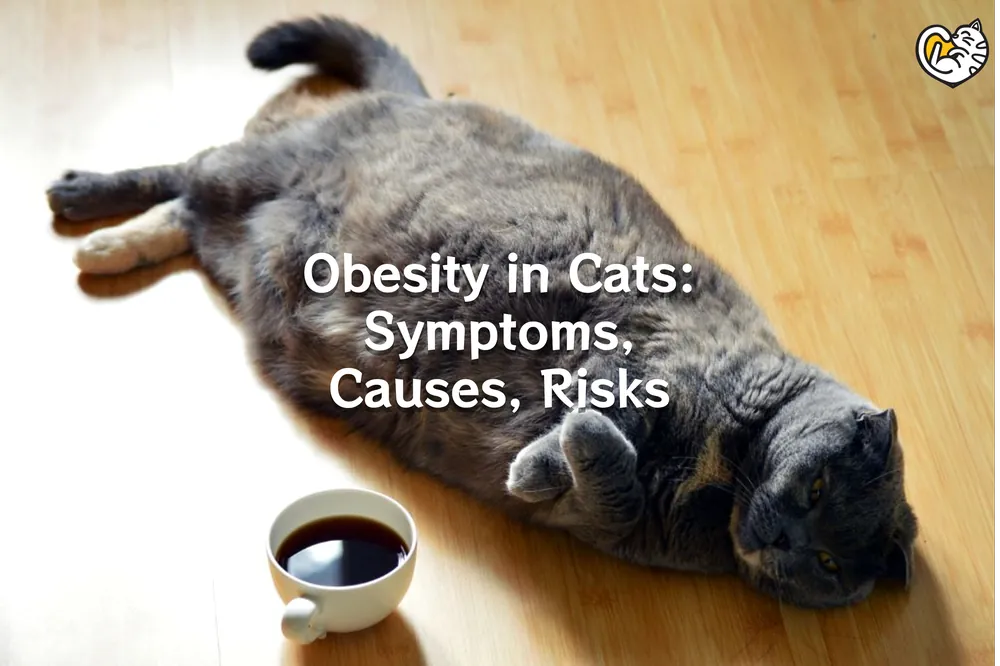Obesity in Cats – Symptoms, Causes, Risks & Treatment


Let's talk about a weighty issue affecting many of our furry friends: obesity.
It's not just about chunky bellies - feline obesity is a serious health concern that can impact your cat's quality and length of life.
Is Your Cat Picky About Food?
Well, my cats used to be like that too, but now they finished the food all the time!
If your cat doesn’t want to eat the food or finish the food you gave, I have a solution for you. Read my true story here.
What Is Obesity in Cats?
Think of it like extra fluff packing on more pounds than is comfy for your feline friend. We call this "overweight" when they weigh 10-20% more than their ideal weight, and "obese" when it's 20% or more.
Sadly, this extra snuggle weight is actually quite common, affecting up to 63% of kitties in some countries!
Why is Extra Cuddly Not So Cute?
Carrying around all that extra fluff puts a strain on your cat's health. It can weaken their immune system, mess with hormones and digestion, strain their heart, and even make their joints ache.
Middle-aged, neutered, and indoor cats seem more prone to packing on the pounds.
Symptoms of Obesity in Cats
Besides the obvious extra fluff, watch out for these clues:
- Sluggish climber: Struggling to jump on furniture or climb stairs? Extra weight could be holding them back.
- Prefer naps to playtime? That could be a sign of being too round to move around easily.
- Loss of a visible waistline is a hint your cat's carrying extra pounds.
- Rib Check Fail: If you can't easily feel their ribs or hip bones under their fur, they might be overweight.
- Flat Top View: From above, does your cat look more like a rectangle than a curvy kitty? That's another chubbiness clue.
- Dirty fur: Struggling to groom themselves due to extra weight? Their fur might look messy or unkempt.
- Does their collar keep getting tighter? That's a sign they're packing on the pounds!
- Bathroom troubles: Less frequent poops or more gas passing could be linked to being overweight.
Causes of Obesity in Cats
There are two main reasons why cats pack on the pounds: their own bodies and their food choices.
Body Matters:
- Age: Cats in their prime (8-12 years old) are more prone to chubbiness than youngsters or seniors.
- Neutered: After neutering, cats' metabolisms can slow down, making it easier to put on the pounds.
- Environment: Indoor cats, with fewer opportunities to zoom around, often struggle with keeping weight in check.
- Achy Joints: Underlying health problems like arthritis can make it harder for cats to move, burning fewer calories and increasing the risk of weight gain.
Food Choices:
- Kibble: A diet heavy in kibble can easily lead to extra fluff compared to wet food and freeze-dried food.
- Measuring Mishaps: Eyeballing portions? That's a recipe for overfeeding! Stick to measured scoops and the right bowl size for accurate portions.
- Speedy Food Consumption: Gobbling down food in seconds? This can lead to boredom, begging, and even more munchies! Slow down mealtime to avoid extra snacks.
- Feast or Famine: Feeding big meals once or twice a day can trigger begging and weight gain. Smaller, more frequent meals might be a better option.
- Treat Overload: Those tasty tidbits are packed with calories. Too many treats can tip the scales in the wrong direction and mess up your cat's diet.
What are the Risks Posed by Obesity?
The extra fluff on your feline friend isn't just cute, it can be downright dangerous. Obesity is a serious threat to cats' health, shortening their lives and making them more prone to a whole bunch of nasty diseases.
Living Shorter Lives:
- Just being a bit overweight can shave years off your cat's life. Studies show obese cats (8-12 years old) are 2.8 times more likely to die early than lean kitties. That's a big difference!
Trouble in the Body:
Remember, that extra fat isn't just sitting there. It's actually acting like a troublemaker, pumping out inflammation-causing hormones and stressing out the body's tissues. This sets the stage for a whole raft of health problems:
- Cancer: The big C, unfortunately, becomes more likely with extra pounds.
- Diabetes: Sugar problems can plague overweight cats, leading to serious health issues.
- Heart Trouble: Pump trouble! Obesity strains the heart and raises blood pressure, putting a load on your furry friend's ticker.
- Achy Joints: Arthritis and joint pain are more common in chubby cats, making it harder for them to move and enjoy life.
- Bladder Stones: Ouch! These painful stones are more likely to form in overweight cats.
- Surgery Woes: Putting an obese cat under anesthesia is riskier, adding another worry to surgery.
- Liver Worries: Stop eating due to illness? Overweight cats are more prone to a life-threatening liver condition called hepatic lipidosis.
- Skin and Coat Blues: Extra fluff can come with skin and fur problems, making your cat itchy and uncomfortable.
- Fighting Fit? Not Quite: Obesity weakens the immune system, making it harder for your cat to fight off infections.
Obesity is a serious health threat for cats. By keeping your kitty at a healthy weight, you're giving them the best chance at a long, happy, and healthy life. Remember, even small reductions in weight can make a big difference!
How Can I Tell If My Cat is Obese?
Before we worry about weight loss battles, we need to know if there's a fight to be had! Recognizing an overweight kitty can be tricky, thanks to all the cute, round felines in the media.
But fear not, this handy guide will help you see through the fluff and assess your cat's true body condition:
Visual Clues:
- Ribs and Hips: Can you easily see them? No dice? Your cat might be carrying extra baggage.
- Waistline: Lost and gone? That's another fluffy flag.
- Belly Bulge: Does it jut out proudly? Time to re-evaluate the treat budget.
The Hand Test:
Grab your paw and give it a little feel, palm and back of hand included. Now, gently run your hand along your cat's side just behind their front legs. Time for the comparison game!
- Feels like the back of your hand: Congrats! Your cat's got the purrfect body condition, lean and mean like a jungle kitty.
- Feels like your knuckles: Uh oh, skinny bones alert! Your cat might be underweight and need some extra care from their favorite human (that's you!).
- Feels like the palm of your hand: Whoa, hold the kibble! This squishy feeling means your cat might be packing on the extra fluff and could benefit from a weight loss adventure.
Vet Check for Extra Clues:
Remember, the hand test is a great starting point, but your vet can give you a more precise diagnosis.
They'll have a special scale to weigh your cat and a body condition score system (like 1-5, with 3 being ideal) to assess their overall body condition. This helps track progress and make sure your weight loss plan is on the right path.
Two cats with the same weight but different breed can hold their fluff differently. One might be a sleek athlete, while the other could be packing the pounds under their fur. That's why the Body Condition Score is crucial.
For a more detailed diagnosis, they might recommend:
- Physical Exam: Checking for joint discomfort, signs of high blood pressure, or potential diabetes.
- Bloodwork: Unveiling any hidden health issues related to obesity.
Treatment of Obesity in Cats: How to Make Your Cat Lose Weight
So, your furry friend's packing some extra fluff? Don't worry, we've got the purrfect recipe for a healthy weigh-down! But ditch the idea of drastically reduced diets – we're talking about a safe and sustainable approach.
1. Ditch the Reduced Meals
Giving your cat less of their usual food just won't cut it. This sneaky tactic might lead to them going hungry and missing out on vital nutrients.
2. Fuel Up with the Right Food
Say no to the low-quality cat food which is filled with fillers and switch to real cat food with high protein, such as the Grace Cat freeze-dried food. It is packed with the right kind of fuel to help your cat shed the pounds without feeling famished.
Fillers like corn and grain in cat food are one of the main culprits that contribute to cat obesity.
3. Portion Control is Key
Measure those mealtimes! Use the feeding guide provided by the cat food you bought and test it to figure out the perfect portions for your feline friend, ensuring they get enough to feel full and supported while still losing weight.
Choose a cat-sized bowl that makes the food look just right. For slow eaters, try puzzle feeders, they'll have to work for their treats!
Consistency is key, so ditch the midday unhealthy snacks and stick to the plan.
4. Treats: Fun, Not Fuel
Yes, even treats can be part of the plan! Incorporate healthy, low-calorie options like GraceFull Raw freeze-dried chicken into your cat's diet as occasional rewards or toppers.
Remember, we are going for a happy and healthy weight-loss plan.
5. Weigh-Ins: Keeping You on Track
Monitor the progress every month and make adjustments if needed. This ensures your cat's losing weight at a safe and steady pace, not becoming a skinny legend overnight!
6. Move It or Lose It
Beyond the food, let's get your cat moving! Puzzle feeders make mealtime an active adventure.
Indoor cat? No problem! Feed small meals on high surfaces, encouraging jumps and climbs.
7. From Fluffy to Fit
The ultimate goal: a healthy, slimmed-down kitty!
Once your cat reaches their ideal weight, it's time to slowly transition back to a regular diet, like switching off the "slim-down" button on their metabolism. Think of it as a reverse diet to help them adjust to a healthy maintenance food amount.
8. Yo-Yo No-No
Remember, weight loss shouldn't be a rollercoaster ride! Maintaining a healthy weight is key to keeping your cat feeling fantastic and avoiding those dreaded yoyo diet effects.
FAQs
1. What’s the difference between overweight vs. obese?
A cat is overweight when they're 10-20% above their ideal weight, and obese when it's over 20%. Your vet can help you assess your cat's body condition.
2. Does obesity shorten a cat’s life?
Sadly, yes. Obesity can lead to diabetes, cancer, and other diseases that shorten your cat's lifespan.
Conclusion
Shedding extra pounds might take some effort, but the rewards are endless! A healthy weight improves your cat's quality of life, reducing the risk of diseases and keeping them playful and energetic.
So, join us on this weight-loss adventure, fuel your feline friend with the right food, and watch them purr their way to a happier, healthier life!
Do you know the biggest challenge faced by cat owners?
It’s not what you think. Find out the answer here (before it’s too late).





